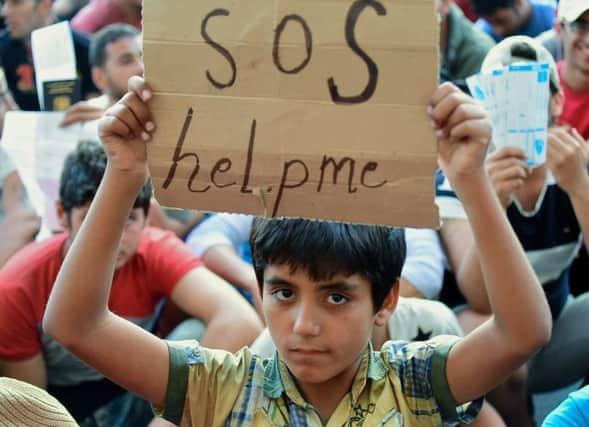Leaders: Individuals pressure governments to act


Thus it is proving, here, and across the EU, as presidents and prime ministers struggle to reach agreement on border policing, migrant quotas and a common strategy. When all seems lost, it is the response of ordinary people that gives hope and which inspires thousands more by their example.
In Germany, ordinary citizens have offered to open their homes to migrants. Others have joined large convoys of private cars to take migrants from Austria into Germany.
Advertisement
Hide AdAdvertisement
Hide AdIt is one of the most deeply moving spectacles yet in a crisis that has threatened to overwhelm the EU.
Now come reports that people across the UK are stepping up to offer help and succour to refugees who have lost their homes and have nothing in the world but the clothes they stand up in.
Thousands have offered to house refugees in their own homes, signing up to an online database. Its organiser, a mother-of-two consultant at Cambridge University Hospital, has been overwhelmed by the deluge of support she has received, with offers of shelter from 2,000 people in just three days
Meanwhile, the Pope said every Catholic parish in Europe should host a migrant family. He appealed for “every parish, every religious community, every monastery, every sanctuary” to take in a family.
While politicians have struggled to find a positive way forward, this upsurge of people support for refugees could hardly be in starker contrast.
However, heart-warming though this development is, individual acts of shelter and compassion cannot answer the enormity of the crisis facing the countries of Europe. Migrants continue to pour in – German officials say 11,000 asylum seekers arrived in the country on Saturday, with another 10,000 expected yesterday.
The concern is that as more Syrian refugees successfully make the tortuous journey to southern Europe and Germany, the more will be encouraged to throw caution to the winds and join the mass movement. And to the numbers from Syria should be added migrants from the Sudan, Eritrea, Afghanistan, Libya, and even Pakistan and Bangladesh. There is no escaping the need for a tough and unsentimental approach at Europe’s borders to sort out genuine refugees from opportunist economic migrants.
Prime Minister David Cameron has belatedly agreed to take in more Syrian refugees.
Advertisement
Hide AdAdvertisement
Hide AdVoluntary actions by individuals can only do so much in the face of this mass movement of peoples.
But they can shame governments into more effective action than we have seen to date.
Record-breaking royal continuity
It IS a momentous week for the Queen as she is set to become the longest reigning monarch on Wednesday. But it is very much “business as usual”.
Yesterday, she attended Crathie Kirk as she has regularly done over the years. The autumn gathering by the church has become a time-honoured tradition – an unchanging piece of Royal ritual to some, but for many a comforting continuity of faith and dedication in a world that has changed mightily in the 63 years of her reign.
The common assumption has been that it was Queen Victoria (1837 to 1901) whose reign spanned the most convulsive changes in Britain at home and abroad – from the industrial revolution through the most expansive era of empire and a period of huge social change.
But the reign of Queen Elizabeth has been no less convulsive. It has stretched through the 20th into the 21st century, witnessing the Cold War, the collapse of the Soviet Union, the rise of the European Union, huge technological advances and 12 prime ministers. Television became a household item, now challenged by the lap top computers and the iPhone. She is the first British monarch to have sent an e-mail, have a message put on the moon and conduct a royal “walkabout”.
And Wednesday sees a return of continuity of sorts as she attends the re-opening of the Borders Railway. The steam locomotive for the formal opening – The Union of South Africa – also serves as a reminder of a past that has long gone.
For 23,226 days, the Queen has provided a unique thread of continuity and stability, and provided throughout a model of public duty and service.